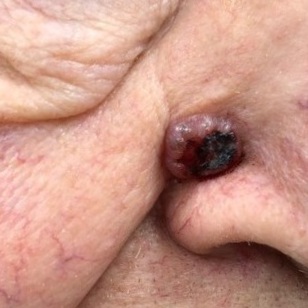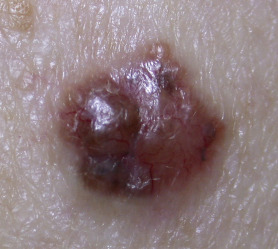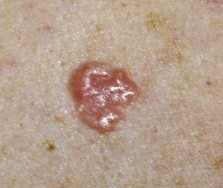A basal cell carcinoma.
Basal Cell Carcinoma (BCC)
Is very common — over 4 million people develop BCC per year.
Occurs usually on sun exposed skin, such as the face, neck, back, and forearms.
Is the least aggressive type of skin cancer — it almost never travels to other sites of the body to become life-threatening.
Grows locally — it can bleed, grow deeply near nerves and blood vessels, and can cause an open wound.
Detecting Basal Cell:
Like all skin cancers, basal cell carcinoma comes in many shapes and sizes!
They can be flat and look very innocent, or they can be a slow-growing bump. Sometimes they change, growing darker or redder or sensitive over time.
If you have a spot that is starting to itch or bleed or is changing color, get it checked!
Diagnosing and Treating Basal Cell Carcinoma:
Diagnosing basal cell carcinoma:
If your doctor suspects a BCC, you will most likely need to have a skin biopsy. A small piece of skin is sampled and sent to a pathology lab for analysis. Skin biopsies are easy, scarring is minimal, and it is important to find out what is growing on your skin!
Treating basal cell carcinoma:
Treatment depends on the type of basal cell that you have. There are superficial basal cells, basal cells that are scar-like (“sclerosing” basal cell carcinoma), nodular basal cells, pigmented basal cells.
Your doctor may recommend an excision — a surgical removal of the skin cancer. This is done in the office and it is usually a simple process. You’ll have stitches and a scar.
You may be referred for “Mohs Surgery”, another technique for removing skin cancer. Mohs is not done at MC Medical, but if you are in need of this procedure, we can make a referral for you.
Do I really need Mohs?
The answer is not always. Not all basal cell carcinoma needs to be removed by Mohs technique. It is important to have your questions answered about your skin cancer treatment. If you are not sure, please call your doctor.
If you have a changing spot on your skin, get it checked!





